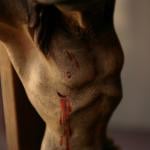During this weekend’s Mass, I was struck by the second reading of the liturgy from Saint Paul’s first letter to the Corinthians:
I urge you, brothers and sisters, in the name of our Lord Jesus Christ,
that all of you agree in what you say,
and that there be no divisions among you,
but that you be united in the same mind and in the same purpose.
For it has been reported to me about you, my brothers and sisters,
by Chloe’s people, that there are rivalries among you.
I mean that each of you is saying,
“I belong to Paul,” or “I belong to Apollos,”
or “I belong to Cephas,” or “I belong to Christ.”
Is Christ divided?
Was Paul crucified for you?
Or were you baptized in the name of Paul?
For Christ did not send me to baptize but to preach the gospel,
and not with the wisdom of human eloquence,
so that the cross of Christ might not be emptied of its meaning.
January 18-25 marks the International Week of Prayer for Christian Unity. This is usually interpreted as prayer for unity across denominations. Indeed, throughout its history, the Christian Church has experienced schism and division at many points. Paul’s words serve to remind us the one we ultimately follow more than any ecclesial authority. It is in the name is Jesus we are baptized; it is Jesus whom we follow.
The unity I feel the most urgent need to pray for during this week is not between any particular denominations, but US Christians currently pulled apart by political division. For the past two years, I’ve been studying the impact of the current political climate in the US on people’s interpersonal relationships. I have interviewed people who have lost friends and grown distant from family in today’s political climate. I’ve read books like David French’s Divided We Fall, which lays out scarily plausible scenarios in which the United States could break into two or more countries, and Luke Mogelson’s The Storm Is Here, which includes eye-witness reporting from some of the most violent episodes of civil unrest from 2020-2021: COVID-19 lockdown protests in Michigan, Black Lives Matter protests that turned deadly in Oregon, and ultimately the January 6, 2021 attack on the US Capitol. These expert commentaries on the situation as well as my own research have revealed an alarming situation.
However, I’ve also spoken with people who have managed to keep their relationships intact: a brother and sister in their thirties who bond over childrearing even as they disagree over politics; an older man who walked the Appalachian Trail with his five brothers, civilly discussing religion and politics along the way; the founder of New York Encounter, a Catholic cultural festival that brings people together across the divide for engaging lectures, performances and art exhibitions in Manhattan every February. I’ve befriended a retired social worker who has made it his life’s work to lead workshops aimed at keeping their relationships intact across distance. I’ve read books like Julie Hanlon Rubio’s Search for Common Ground that offer hope for unity in the Catholic Church. Since starting my new job at Saint Vincent College in western Pennsylvania, where I witness equally strong liberal and conservative elements among faculty and students, I see a real potential for fruitful dialogue.
To me, Christian unity does not mean uniformity. In addition to being terribly boring, such sameness would surely lead to corruption and sameness. What impresses me most about the Catholic faith is indeed our diversity. I had the opportunity to experience this directly when I attended World Youth Day in Poland in 2016 — I met Catholics around the world who brought their music, art, and traditions with them. Having attended Mass in places as culturally disparate as Bethlehem, London and Managua, I am fascinated by the ways in which similarity and difference are able to coexist. This, it seems, is what we are struggling to learn in the United States today – in secular contexts as well as religious ones.
In poet Dana Gioia’s essay “The Catholic Writer Today,” we are asked to return to a focus on the imagination. “If American Catholicism has become mundane enough to be consumed by party politics, perhaps it’s because the Church has lost its imagination and creativity,” he suggests. He argues that we need a renewal of the Church’s centuries-long role as patron of the arts; indeed, what he sees as a split between religion and the literary/artistic landscape in the US has led to the impoverishment of both. I concur that this is a good and necessary approach, and as I continue my own project, it is to the arts – music, poetry, and visual art – where I go in search of Christian unity within diversity, the Jesus we are called to imagine and reimagine.
















